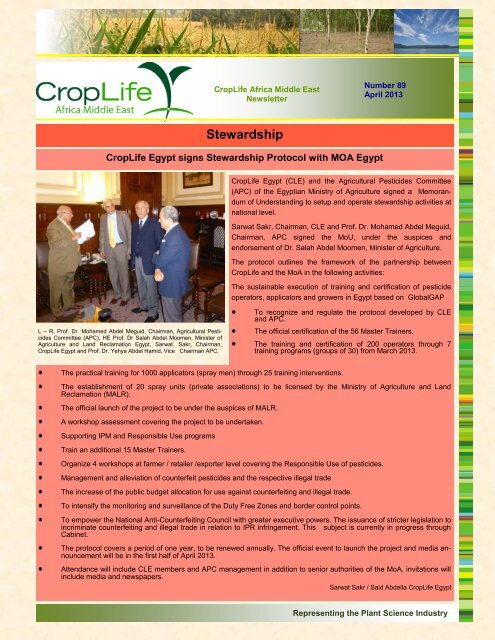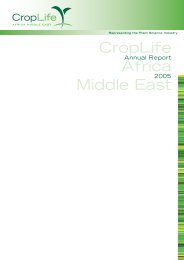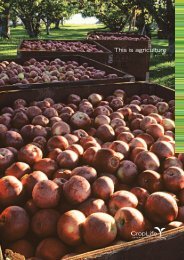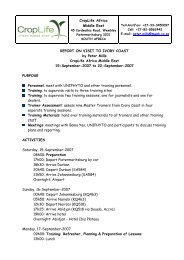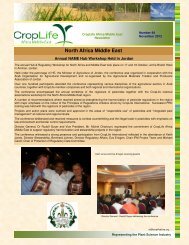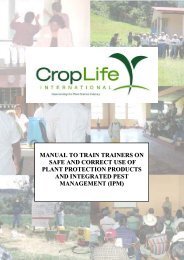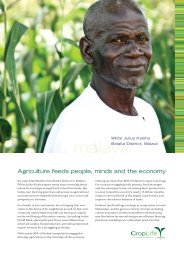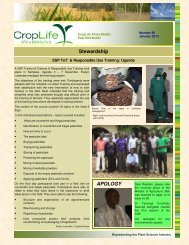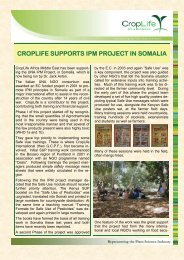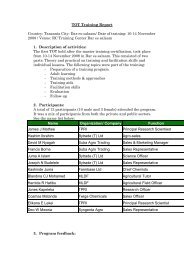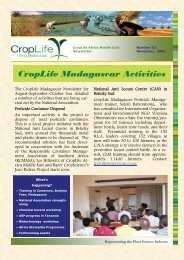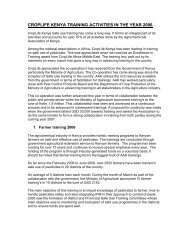Newsletter April 2013 - CropLife Africa Middle East
Newsletter April 2013 - CropLife Africa Middle East
Newsletter April 2013 - CropLife Africa Middle East
Create successful ePaper yourself
Turn your PDF publications into a flip-book with our unique Google optimized e-Paper software.
<strong>CropLife</strong> <strong>CropLife</strong> <strong>Africa</strong> <strong>Africa</strong> <strong>Middle</strong> <strong>East</strong><br />
<strong>Newsletter</strong> <strong>Newsletter</strong><br />
Number 89<br />
<strong>April</strong> <strong>2013</strong><br />
Stewardship<br />
<strong>CropLife</strong> Egypt signs Stewardship Protocol with MOA Egypt<br />
<strong>CropLife</strong> Egypt (CLE) and the Agricultural Pesticides Committee<br />
(APC) of the Egyptian Ministry of Agriculture signed a Memorandum<br />
of Understanding to setup and operate stewardship activities at<br />
national level.<br />
Sarwat Sakr, Chairman, CLE and Prof. Dr. Mohamed Abdel Meguid,<br />
Chairman, APC signed the MoU, under the auspices and<br />
endorsement of Dr. Salah Abdel Moomen, Minister of Agriculture.<br />
The protocol outlines the framework of the partnership between<br />
<strong>CropLife</strong> and the MoA in the following activities:<br />
The sustainable execution of training and certification of pesticide<br />
operators, applicators and growers in Egypt based on GlobalGAP<br />
L – R, Prof. Dr. Mohamed Abdel Meguid, Chairman, Agricultural Pesticides<br />
Committee (APC), HE Prof. Dr Salah Abdel Moomen, Minister of<br />
Agriculture and Land Reclamation Egypt, Sarwat. Sakr, Chairman,<br />
<strong>CropLife</strong> Egypt and Prof. Dr. Yehya Abdel Hamid, Vice Chairman APC.<br />
To recognize and regulate the protocol developed by CLE<br />
and APC.<br />
The official certification of the 56 Master Trainers.<br />
The training and certification of 200 operators through 7<br />
training programs (groups of 30) from March <strong>2013</strong>.<br />
The practical training for 1000 applicators (spray men) through 25 training interventions.<br />
The establishment of 20 spray units (private associations) to be licensed by the Ministry of Agriculture and Land<br />
Reclamation (MALR).<br />
The official launch of the project to be under the auspices of MALR.<br />
A workshop assessment covering the project to be undertaken.<br />
Supporting IPM and Responsible Use programs<br />
Train an additional 15 Master Trainers.<br />
Organize 4 workshops at farmer / retailer /exporter level covering the Responsible Use of pesticides.<br />
Management and alleviation of counterfeit pesticides and the respective illegal trade<br />
The increase of the public budget allocation for use against counterfeiting and illegal trade.<br />
To intensify the monitoring and surveillance of the Duty Free Zones and border control points.<br />
To empower the National Anti-Counterfeiting Council with greater executive powers. The issuance of stricter legislation to<br />
incriminate counterfeiting and illegal trade in relation to IPR infringement. This subject is currently in progress through<br />
Cabinet.<br />
The protocol covers a period of one year, to be renewed annually. The official event to launch the project and media announcement<br />
will be in the first half of <strong>April</strong> <strong>2013</strong>.<br />
Attendance will include CLE members and APC management in addition to senior authorities of the MoA, invitations will<br />
include media and newspapers.<br />
Sarwat Sakr / Said Abdella <strong>CropLife</strong> Egypt<br />
Representing the Plant Science Industry
Page 2<br />
<strong>CropLife</strong> <strong>Africa</strong> <strong>Middle</strong> <strong>East</strong> <strong>Newsletter</strong> Number 89<br />
<strong>April</strong> <strong>2013</strong><br />
<strong>CropLife</strong> Sudan (SAGA) Obstocks Assessment<br />
Professor Nabil Bahseer expert on Obstocks and Hans<br />
Dobson of <strong>CropLife</strong><br />
Above Right:: R-L Dr.Abdelahim, Federal Minister of Agriculture and irrigation,<br />
Mr.Sirlkhatim, Chairman SAGA and Mr. Khidir Gibreel, Registrar of the NPC, attending<br />
the obstocks workshop at the Grand Holiday Villa-Khartoum.<br />
Hans Dobson of <strong>CropLife</strong> International visited Sudan 15-20 Marsh to meet with various authorities and concerned stakeholders<br />
on the issue of the large quantities of obsolete stocks of pesticides in the country.<br />
His activities covered the following:<br />
Meeting with the Executive Board of the Sudan Agrochemicals Association (SAGA) and the Registrar of the National<br />
Pesticides Council (NPC).<br />
Visiting two depots in the Wad Medani, of Gezira State and meetings with the officials and stakeholders in the region.<br />
Meeting with the Federal Minister of Agriculture and Irrigation and the Federal Minister of Health.<br />
Participating at a workshop on obsolete stocks held at the Grand Holiday Villa on 19 March and addressing the issue of<br />
obsolete stocks with a <strong>CropLife</strong> perspective. This visit was highly valued by SAGA and viewed as a serious start of a<br />
Sudanese strategy to deal with obsolete pesticides in the country.<br />
<strong>CropLife</strong> Uganda: IPM / RU Training<br />
Mohamed Abdella Ali, SAGA<br />
Group Participants<br />
Calibration Exercise<br />
A “4 day” training of the Field Coordinators and staff of member companies in Uganda took place week commencing 18 March.<br />
The training covered both IPM / RU as a follow-up to last years December meeting, and anti-counterfeit training.<br />
Participants underwent both, a pre, and post evaluation. They also prepared a training on IPM and “scouting for farmers.<br />
Results were particularly good for the written tests.<br />
Evelyn Lusenaka<br />
Representing the Plant Science Industry
Page 3<br />
<strong>CropLife</strong> <strong>Africa</strong> <strong>Middle</strong> <strong>East</strong> <strong>Newsletter</strong> Number 89<br />
<strong>April</strong> <strong>2013</strong><br />
<strong>CropLife</strong> Côte d’Ivoire and Directorate of Plant Protection Discuss Training Activities<br />
Above Left: R. Yeboué, Executive Secretary, <strong>CropLife</strong> CI, reading the conclusions of the meeting : Above Left: Following the presentation of the report<br />
on the 2012 training session by M. Dosso, President, <strong>CropLife</strong> CI, to the Director of Agriculture and Food Security.<br />
On 10 March, members of <strong>CropLife</strong> Côte d’Ivoire together with Bama Yao met with the Director General of Agriculture and<br />
Food Security, Director and Deputy of Plant Protection, Min Agric, in Abidjan, to discuss elements of training.<br />
The prime topic covered hinged on;<br />
The follow up on the dealers training activities, and the strengthening of the dealer training scheduled for December <strong>2013</strong>.<br />
<strong>CropLife</strong> Côte d’Ivoire presented to the meeting the training modules targeting dealers, applicators, extension officers and<br />
agents. Joint debate led to the following recommendations:<br />
That an impact assessment needs to be undertaken.<br />
That <strong>CropLife</strong> Côte d’Ivoire and Min Agric should jointly consider introducing a training brochure.<br />
That trainees and newly appointed officers of the Plant Protection Directorate of Min Agric should attend the training course.<br />
That <strong>CropLife</strong> Côte d’Ivoire should consider organizing training sessions in cities or regions of high pesticide usage.<br />
That the participation of pesticide control agents be used in the training of customs officers, particularly those assigned for<br />
control at country borders.<br />
That a national seminar, with the commitment of a ministerial committee, should be considered to strengthen the fight against<br />
the illegal pesticide trade. Prior to such an event-taking place, <strong>CropLife</strong> Côte d’Ivoire and Min Agric needs to embark on a<br />
communications program.<br />
Bama Yao<br />
Representing the Plant Science Industry
Page 4<br />
<strong>CropLife</strong> <strong>Africa</strong> <strong>Middle</strong> <strong>East</strong> <strong>Newsletter</strong> Number 89<br />
<strong>April</strong> <strong>2013</strong><br />
SSP Training of Trainers for WCF Project<br />
A group exercise<br />
session (L) followed<br />
by a demonstration<br />
on a mist blower<br />
(R) (c ou rte s y:<br />
<strong>CropLife</strong> Nigeria)<br />
Training dates were 26 Feb – 6 March in Akure, Ondo State, Nigeria and 18 – 22 March, in Bassam, Côte d’Ivoire and Kumasi,<br />
Ghana. The objective was to train field officers from member companies of the national associations to serve as SSP trainers<br />
for the implementation of WCF-ACI program.<br />
Nigeria: 18 participants (two female) attended the theoretical session during the first week; they then facilitated a practical<br />
session for 15 lead farmers during the second week.<br />
Côte d’Ivoire & Ghana: 16 participants (including one female) attended the first week for the theoretical session in Côte d’Ivoire,<br />
and 15 in the session in Ghana.<br />
In Côte d’Ivoire a one-day ToT was conducted, as most of the participants had never participated in a regular ToT program.<br />
This introduction was found very useful as reported in the course evaluation.<br />
The practical field sessions in Ghana and Côte d’Ivoire are scheduled for 8 – 12 <strong>April</strong> and 22 – 26 <strong>April</strong> respectively, this to<br />
meet the needs of the member companies.<br />
Bama Yao<br />
A group working<br />
on a mist blower<br />
(L) to identify<br />
different parts<br />
and their funct<br />
i o n s ( R )<br />
( c o u r t e s y :<br />
<strong>CropLife</strong> CI).<br />
A participant<br />
facilitating a<br />
session on preparation<br />
before the<br />
application of<br />
p e s t i c i d e s<br />
( c o u r t e s y :<br />
<strong>CropLife</strong> CI).<br />
Representing the Plant Science Industry
Page 5<br />
<strong>CropLife</strong> <strong>Africa</strong> <strong>Middle</strong> <strong>East</strong> <strong>Newsletter</strong> Number 89<br />
<strong>April</strong> <strong>2013</strong><br />
IPR Anti-Counterfeiting<br />
Workshop on the Practical Approaches to IP Utilization and Protection in <strong>Africa</strong> – Dar es Salaam<br />
19 – 21 March<br />
Organized by:<br />
The <strong>Africa</strong> Intellectual Property Group (AIPG) & The U.S. Department of Commerce<br />
Commercial Law Development Program (CLDP)<br />
In coordination with: The Government of Tanzania<br />
The <strong>East</strong> <strong>Africa</strong>n Community (EAC)<br />
U.S. Embassy Dar es Salaam<br />
Hon. Dr. Abdallah Kigoda (MP), Minister of Industry,<br />
Trade, and Marketing<br />
Ambassador Dr. Konji Sebati, Director, Department of Traditional Knowledge<br />
and Global Challenges, WIPO<br />
The Hon. Dr. Abdallah Kigoda (MP), Minister of Industry, Trade, and Marketing, undertook the Opening Address.<br />
There were in excess of 150 delegates, which provided the opportunity for networking. CLAME was suitably represented with<br />
5 participants.<br />
Presentations of professional interest included:<br />
The IP and Development Question: How intellectual property and development intersect in <strong>Africa</strong>.<br />
Investment, Commerce and Intellectual Property: Robust IPR protection and enforcement are crucial to facilitating<br />
commerce, and attracting investment.<br />
Consumer Protection and the Dangers of Counterfeit Goods: Combating counterfeit products that pose a threat to<br />
public health and safety on the <strong>Africa</strong>n Continent.<br />
Establishing <strong>Africa</strong>n Brands: Exchange of experiences in trademark branding, value capture and commercialization.<br />
Counterfeits and Pirated Goods: Trans-Border Issues: Tackling the issues involved in the interdiction of counterfeit and<br />
pirated goods across borders.<br />
Representing the Plant Science Industry
Page 6<br />
<strong>CropLife</strong> <strong>Africa</strong> <strong>Middle</strong> <strong>East</strong> <strong>Newsletter</strong> Number 89<br />
<strong>April</strong> <strong>2013</strong><br />
Marie-Flore Johnson, Attorney-<br />
Prosecutor, Computer Crime and<br />
Intellectual Property Section, U.S.<br />
Department of Justice<br />
<strong>CropLife</strong>, represented: L-R, Richard Sikuku,<br />
Wynand van der Walt , Harish Dhutia and<br />
Ernest Massae<br />
Scoring with IP: The juncture of sports and IP – well-known trademarks, sports broadcasting and related issues in<br />
<strong>Africa</strong><br />
Promoting <strong>Africa</strong>n Culture Through IP: Exchange of experiences concerning the protection and monetization of<br />
traditional knowledge and traditional cultural expressions in <strong>Africa</strong>.<br />
Agricultural Innovation in <strong>Africa</strong>: Harnessing agricultural innovation in <strong>Africa</strong> through IPR, as well as dealing with issues<br />
in counterfeiting of agricultural inputs.<br />
Facilitating Innovation and Entrepreneurship: Public and Private Sector Efforts: Increasing <strong>Africa</strong>n competitiveness<br />
through innovation policies, franchising, licensing and commercialization of R & D, entrepreneurship and effective<br />
technology transfer.<br />
Practical Keys to Effective Criminal IPR Enforcement: Best practices, experiences, and trends in addressing IPR<br />
infringement through investigative, prosecutorial and judicial measures.<br />
Les Hillowitz<br />
Representing the Plant Science Industry
Page 7<br />
<strong>CropLife</strong> <strong>Africa</strong> <strong>Middle</strong> <strong>East</strong> <strong>Newsletter</strong> Number 89<br />
<strong>April</strong> <strong>2013</strong><br />
Regulatory<br />
Minor Use Registration workshop, Rabat, Morocco, February 12-13, <strong>2013</strong><br />
Group Participants<br />
On February 12-13, <strong>2013</strong> a multi-stakeholder workshop focusing on minor use / minor crop registration issues, was held in<br />
Rabat, Morocco. This workshop was planned as a result of in-country pesticide consultations held in Morocco in <strong>April</strong> 2012<br />
with Morocco’s National Food Safety Office (ONSSA), the National Institute for Agronomic Research (INRA), the Autonomous<br />
Establishment for Export Control and Coordination (EACCE), vegetable and strawberry export trade association (ASPEM and<br />
AMCEF), and pesticide trade associations (<strong>CropLife</strong> and PROTECO). The key and unanimous recommendation from those<br />
consultations was that a multi-sector workshop be held to develop a minor use strategic plan in Morocco. ONSSA (the Food<br />
Safety Authority) was particularly focused on the need to “resolve” the minor use situation in Morocco and communicated a<br />
sense of urgency for technical assistance efforts on this topic.<br />
*Debra Edwards (USDA Pesticide Consultant) and Elizabeth Johnson (FAS/USDA) facilitated the workshop<br />
<strong>CropLife</strong> Morocco successfully contributed and actively participated at this workshop.<br />
Discussion Points:<br />
As during the consultation in 2012, mint is a focus of concern for the lack of pesticide registrations in Morocco, illegal<br />
pesticide residues, and lack of MRLs in export markets. Though some new low-risk products have come onto the<br />
market (e.g., spinosad and Bacillus thuringiensis (Bt)), these are more expensive than the more toxic organochlorine<br />
and organophosphate products currently in use and for which no clearances exist (chlorpyrifos, dimethoate, endosulfan,<br />
etc.).<br />
ONSSA continues to be very engaged in the minor crop registration issue and has shown considerable initiative in<br />
seeking ways to extrapolate efficacy data for minor crops from other countries with similar pest control problems and<br />
climatic conditions (e.g., southern Europe).<br />
Representing the Plant Science Industry
Page 8<br />
<strong>CropLife</strong> <strong>Africa</strong> <strong>Middle</strong> <strong>East</strong> <strong>Newsletter</strong> Number 89<br />
<strong>April</strong> <strong>2013</strong><br />
Minor Use Registration workshop, Rabat, Morocco, February 12-13, <strong>2013</strong> cont..<br />
The EACCE and ASPEM participants both spoke of a proposal in the works to establish a technical center to assist small<br />
acreage growers. The technical center would consist of three sections (1) Nursery/Certified seedlings, (2) Pilot farms for<br />
experimentation on small acreages, and (3) A training center to provide technical support to growers, including in the area of<br />
marketing. The proposal has been in the works for two years. These groups voiced a clear need for more information transfer<br />
from government sources.<br />
<strong>CropLife</strong> Morocco suggested that future event planners should work to include crop producers and pesticide distributors. The<br />
<strong>CropLife</strong> presentation focused on: (1) need for better communication with and training of small farmers, (2) problems with<br />
counterfeit/smuggled pesticides, (3) the need to update the pesticide regulatory laws, and (4) the need for a National<br />
Multi-Stakeholder Committee to review the list of minor crops annually.<br />
A continued emphasis on the need for extension efforts and awareness programs for small growers was mentioned multiple<br />
times by many of the stakeholders. There are current efforts by USAID, FAO, and ONSSA in collaboration with Moroccan<br />
government and research organizations to train small farmers, but better communication is needed to ensure awareness of the<br />
trainings to the pertinent audience.<br />
At the close of the workshop, ONSSA committed to coordinate the selection of priorities for the Global Minor Use Field Trial<br />
Project (tropical fruit) as well as for mint. The consensus was that it would benefit Morocco to be involved in the project and<br />
associated training and that training in risk assessment would also be useful.<br />
Extract from “Trip Report” – Debra Edwards, PhD Independent Consultant (Univ. MO)<br />
CEMAC-CPAC Regulatory Initiative<br />
L - R, J. Biakath,<br />
Chairman Stewardship<br />
Committee <strong>CropLife</strong><br />
Cameroon, B. Yao,<br />
<strong>CropLife</strong> AME, Mrs. C.<br />
Azouyangui, Director<br />
General, and B.<br />
Bouato, Permanent<br />
Secretary CPAC during<br />
t h e m e e t i n g i n<br />
Yaoundé, Cameroon<br />
On 22 March in Yaoundé, Mrs Catherine Azouyangui, Director, and Benoît Bouato, Permanent Secretary of CPAC, Jean<br />
Biakath, Chairman of Stewardship Committee, <strong>CropLife</strong> Cameroon and Bama Yao, Regional Coordinator met to plot progress<br />
of, and planned activities of CPAC, since the last meeting in December. The following was noted:<br />
That Mrs Catherine Azouyangui, appointed as Director General has taken up her post.<br />
That no progress has been made on the relationship between CPAC and the Ministry of Agriculture and Rural<br />
Development (MINADER).<br />
That CPAC should take the first step by contacting the Minister to settle the situation and provide a sound regulatory<br />
environment and policies to attract products.<br />
That both the Director General and the Permanent Secretary will attend the annual workshop in Accra. This will be the<br />
right opportunity for the planned support (registration procedures, GAP/PoR) to the CPAC initiative to be implemented.<br />
Bama Yao<br />
Representing the Plant Science Industry
Page 9<br />
<strong>CropLife</strong> <strong>Africa</strong> <strong>Middle</strong> <strong>East</strong> <strong>Newsletter</strong> Number 89<br />
<strong>April</strong> <strong>2013</strong><br />
Association Management<br />
Agrochemicals Association of Kenya holds Annual General Meeting (<strong>CropLife</strong> Kenya)<br />
L-R, Raphael Kiguta, Treasurer and Kuria Gatonye, Chairman<br />
The Agrochemicals Association of Kenya, the umbrella organization of manufacturers and distributors of crop and pest control<br />
products in Kenya held its Annual General meeting on the 27 March at the Serena Hotel Nairobi.<br />
Kuria Gatonye who is the current Chairman was re-elected for a further term.<br />
The Chairman’s speech highlighted the areas that the incoming Executive Committee will address during their term and included<br />
the following:<br />
Anti-counterfeiting activities with a focus on <strong>CropLife</strong> Kenya’s “3 pillars” namely; training and awareness, development of<br />
a clean supply chain and law enforcement and collaboration.<br />
Management of obsolete pesticides and empty pesticide containers by:<br />
1. Developing and improving systems to help manage obsolete pesticides.<br />
2. Continue with container collection and disposal programs in the pilot area with a view of gradually developing<br />
the same in other parts of the country.<br />
Kuria highlighted the fact that the success of activities will only work if other stakeholders, both the public and private sectors,<br />
are involved. This is more particular to obsolete pesticides and container management programs.<br />
Richard Sikuku, <strong>CropLife</strong> Kenya<br />
Representing the Plant Science Industry
Page 10<br />
<strong>CropLife</strong> <strong>Africa</strong> <strong>Middle</strong> <strong>East</strong> <strong>Newsletter</strong> Number 89<br />
<strong>April</strong> <strong>2013</strong><br />
<strong>CropLife</strong> Uganda holds AGM<br />
<strong>CropLife</strong> Uganda held their 7th Annual General Meeting<br />
on 26 March <strong>2013</strong> at the Fairway Hotel, Kampala.<br />
Attendance included 8 <strong>CropLife</strong> member companies and<br />
6 observers. Michael Odong, Principal Agriculture<br />
Inspector, officially opened the meeting, and who<br />
welcomed the strong partnership between MAAIF and<br />
<strong>CropLife</strong> Uganda. Hon. Deus Bikwasizehi, Patron of<br />
<strong>CropLife</strong> Uganda, later closed the meeting.<br />
The newly elected Executive Committee is as follows;<br />
Stephen Matovu<br />
Anastase Rubangura<br />
Godfrey Ongom<br />
(Chairman)<br />
(Secretary)<br />
(Treasurer)<br />
Major points highlighted during the meeting included;<br />
The need to establish a levy system on all imported crop<br />
protection products and fertilizers. This would support<br />
the national Safe Use program, the management of<br />
empty pesticide containers and the eradication of<br />
counterfeit products. It was agreed that the new<br />
committee should come up with a firm proposal on the<br />
establishment of a levy system to be presented to the<br />
Commissioner, Ministry of Agriculture Animal Industry<br />
and Fisheries (MAAIF), Crop Protection Department.<br />
From right: Anastase Rubangura, Godfrey Ongom, Hon Deus Bikwasizehi,<br />
Stephen Matovu, Betty Atto and Michael Odong<br />
The meeting was informed that for the year 2012 /<strong>2013</strong>;<br />
<strong>CropLife</strong> Uganda’s main activities depended solely on<br />
donors’ funding, namely:<br />
The SMS Scratch Pilot supported by <strong>CropLife</strong> <strong>Africa</strong><br />
<strong>Middle</strong> <strong>East</strong>.<br />
The anti-counterfeiting campaigns funded successfully<br />
by the Agri-Business Initiative Trust with the support<br />
from <strong>CropLife</strong> <strong>Africa</strong> <strong>Middle</strong> <strong>East</strong>.<br />
The meeting tasked the new committee to identify<br />
mechanisms of generating more income into the<br />
Association in order to be less dependent on donor<br />
funding.<br />
A proposal was made that <strong>CropLife</strong> Uganda should<br />
develop a “business plan” covering the next five years<br />
and in the event that funds were available, to hire a<br />
consultant to handle this undertaking.<br />
A further proposal was made in that <strong>CropLife</strong> Uganda<br />
should take up the spray Service Provider (SSP)<br />
concept. This would be a good tool to expand<br />
stewardship practices.<br />
The meeting tasked the new committee to amend the<br />
<strong>CropLife</strong> Uganda constitution.<br />
Betty Atto, <strong>CropLife</strong> Uganda<br />
Front row: (from right) Paul Kyabaggu, Michael Odong, Hon Deus Bikwasizehi,<br />
Stephen Matovu and Anastase Rubangura<br />
Representing the Plant Science Industry
Page 11<br />
<strong>CropLife</strong> <strong>Africa</strong> <strong>Middle</strong> <strong>East</strong> <strong>Newsletter</strong> Number 89<br />
<strong>April</strong> <strong>2013</strong><br />
<strong>CropLife</strong> Mauritius held their AGM on 21 March.<br />
The new Executive Committee for <strong>2013</strong> is as follows:<br />
<strong>CropLife</strong> Mauritius holds AGM<br />
Philippe Le Vieux<br />
Dani Joseph<br />
Clifford Dove<br />
Bernard de Robillard<br />
Dineshing Goburdhun<br />
Murveen Ragobar<br />
President<br />
Vice President<br />
Secretary<br />
Asst Secretary<br />
Treasurer<br />
Asst Treasurer<br />
At the meeting it was announced that Mukesh Rughoo would<br />
replace Serge L’Ecluse as Executive Secretary of the<br />
association.<br />
Mukesh retired from the MSIRI as Head of the Foodcrop<br />
Department. He was very active in development projects and<br />
recently participated in the TOT run by Manon Dohmen.<br />
Dani Joseph, <strong>CropLife</strong> Mauritius<br />
L-R, Philippe Le Vieux and Mukesh Rughoo<br />
<strong>CropLife</strong> South <strong>Africa</strong> Holds AGM<br />
Kobus Steenekamp<br />
<strong>CropLife</strong> South <strong>Africa</strong> held their AGM on Tuesday 26 March and the following<br />
were elected to serve on the Executive Committee:<br />
Kobus Steenekamp<br />
Marius Boshoff<br />
Antonie Delport<br />
Henk van der Westhuizen<br />
Rod Foran<br />
Marcel Dreyer<br />
Johan du Plessis<br />
Hugo Minnaar<br />
Leon Smith<br />
Jacques du Preez<br />
Roy Cackett<br />
Chris van Eeden<br />
Monsanto SA (President)<br />
Enviro Crop Protection (Vice President)<br />
Syngenta SA<br />
Philagro SA<br />
Dow Agrosciences SA<br />
Arysta Lifescience SA<br />
Makhteshim-Agan SA<br />
Nulandis<br />
Klub M5<br />
Nexus AG<br />
Farmers-Agricare<br />
Novon Retail Company<br />
Tom Mabesa <strong>CropLife</strong> South <strong>Africa</strong><br />
Representing the Plant Science Industry
Page 12<br />
<strong>CropLife</strong> <strong>Africa</strong> <strong>Middle</strong> <strong>East</strong> <strong>Newsletter</strong> Number 89<br />
<strong>April</strong> <strong>2013</strong><br />
Plant Biotechnology<br />
Partners and Stakeholders’ Coordination Meeting on Biosafety Capacity Development in <strong>Africa</strong><br />
5 – 6 March and CLI <strong>Africa</strong> Partners Meeting: 7 – 8 March, Accra, Ghana.<br />
Mr. Fredua Agyman, Director for Environment Science, and Technology & Innovation on behalf of the Hon. Minister, undertook<br />
the keynote address for Environment Science, Technology & Innovation, Ghana.<br />
A second prominent guest was Mr. Ouro-Djeri, Director du Cabinet, Ministry of Environment & Forest Affairs, Togo.<br />
The objectives of the workshop were:<br />
To bring together leading biotechnology and biosafety stakeholders and providers of technical assistance to share experiences<br />
and analyze the key capacity building needs and emerging challenges regarding the development and implementation of<br />
workable regulatory frameworks at the national and sub-regional levels<br />
To strengthen the alignment among biosafety service providers and stakeholders to build future collaborative efforts in biosafety<br />
capacity development<br />
To identify action steps and responsibilities to move biotechnology and biosafety agenda forward in <strong>Africa</strong><br />
Key points:<br />
Program updates and plans for the following selected countries were covered:<br />
Kenya<br />
Ghana<br />
Malawi<br />
The following emerging “country opportunities” were addressed:<br />
Cameroon<br />
Ethiopia<br />
Zambia<br />
Zimbabwe<br />
Progress towards sub-regional frameworks for biotechnology and biosafety were addressed covering:<br />
COMESA<br />
ECOWAS / WAEMU<br />
SADC<br />
Sudan became the fourth country in <strong>Africa</strong> to commercialize biotechnology with the planting of 20,000 ha Bt cotton.<br />
By 2015, at least 10 countries will have commercialized biotechnology in <strong>Africa</strong>.<br />
With regard to the CLI <strong>Africa</strong> Partners Meeting, the following was addressed:<br />
Malawi<br />
Uganda<br />
Ghana<br />
Kenya<br />
Zimbabwe<br />
South <strong>Africa</strong><br />
PBS and <strong>Africa</strong>Bio (<strong>Africa</strong>Bio led the development discussions)<br />
PBS, AATF and UBBC (UBBC led the development discussions)<br />
PBS, <strong>Africa</strong> Harvest, AATF (PBS led the development discussions)<br />
ABSF, <strong>Africa</strong> Harvest, ISAAA, AATF (ABSF led the development discussions)<br />
<strong>Africa</strong>Bio, AATF (AATF led the development discussions)<br />
<strong>Africa</strong>Bio (<strong>Africa</strong>Bio led the development discussions)<br />
Representing the Plant Science Industry
Page 13<br />
<strong>CropLife</strong> <strong>Africa</strong> <strong>Middle</strong> <strong>East</strong> <strong>Newsletter</strong> Number 89<br />
<strong>April</strong> <strong>2013</strong><br />
Other country analysis covered the following:<br />
Mozambique<br />
Tanzania<br />
Ethiopia<br />
Zambia<br />
Southern Sudan<br />
Mali<br />
Togo<br />
Cameroon<br />
Niger<br />
Nigeria<br />
The opportunity was taken to present an “Introduction to<br />
CLAME” and to explore synergisms where the crop<br />
protection network in <strong>Africa</strong> could assist in promoting the<br />
benefits plant biotechnology. This area needs to be<br />
explored further.<br />
Mr. Ouro-Djeri, Director du Cabinet, Ministry of Environment & Forest<br />
Affairs, Togo<br />
Les Hillowitz<br />
Group Participants<br />
Representing the Plant Science Industry
Page 14<br />
<strong>CropLife</strong> <strong>Africa</strong> <strong>Middle</strong> <strong>East</strong> <strong>Newsletter</strong> Number 89<br />
<strong>April</strong> <strong>2013</strong><br />
TOP TEN FACTS about Biotech/GM Crops in 2012<br />
FACT # 1. 2012 was the 17th year of successful commercialization of biotech crops. Biotech crops were first commercialized in<br />
1996. Hectarage of biotech crops increased every single year between 1996 to 2012 with 12 years of double digit growth rates,<br />
reflecting the confidence and trust of millions of risk-averse farmers around the world, in both developing and industrial<br />
countries. <br />
FACT # 2. Biotech crop hectares increased by an unprecedented 100–fold from 1.7 million hectares in 1996, to over 170 million<br />
hectares in 2012. This makes biotech crops the fastest adopted crop technology in recent times – the reason – they deliver<br />
benefits. In 2012, hectarage of biotech crops grew at an annual growth rate of 6%, up 10.3 million from 160 million hectares in <br />
2011. Millions of farmers in ~30 countries worldwide, have made more than 100 million independent decisions to plant an<br />
accumulated hectarage of ~1.5 billion hectares, equivalent to 50% more than the total land mass of the US or China; this<br />
reflects the fact that biotech crops deliver sustainable and substantial, socioeconomic and environmental benefits. <br />
FACT # 3. For the first time in 2012, developing countries planted more hectares than industrial countries. Notably, developing<br />
countries grew more, 52%, of global biotech crops in 2012 than industrial countries at 48%. In 2012, growth rate for biotech<br />
crops was at least three times as fast, and five times as large in developing countries, at 11% or 8.7 million hectares, versus 3%<br />
or 1.6 million hectares in industrial countries. <br />
FACT # 4. Number of countries growing biotech crops. Of the 28 countries, which planted biotech crops in 2012, 20 were<br />
developing and 8 were industrial countries; two new countries, Sudan (Bt cotton) and Cuba (Bt maize) planted biotech crops for<br />
the first time in 2012. Germany and Sweden could not plant the biotech potato "Amflora" because it ceased to be marketed.<br />
Stacked traits are an important feature – 13 countries planted biotech crops with two or more traits in 2012, and notably, 10 of<br />
the 13 were developing countries – 43.7 million hectares, or more than a quarter, of the 170 million hectares were stacked in<br />
2012. <br />
FACT # 5. Number of farmers growing biotech crops. In 2012, a record 17.3 million farmers, up 0.6 million from 2011, grew<br />
biotech crops – remarkably over 90%, or over 15 million, were small resource-poor farmers in developing countries. Farmers<br />
are the masters of risk-aversion and in 2012, a record 7.2 million small farmers in China and another 7.2 million in India, elected<br />
to plant almost 15 million hectares of Bt cotton, because of the significant benefits it offers. In 2012 over one-third of a million<br />
small farmers in the Philippines benefited from biotech maize. <br />
FACT # 6. The top 5 countries planting biotech crops. The US continued to be the lead country with 69.5 million hectares, with<br />
an average ~ 90% adoption across all crops. Brazil was ranked second, and for the fourth consecutive year, was the engine of<br />
growth globally, increasing its hectarage of biotech crops more than any other country – an impressive record increase of 6.3<br />
million hectares, up 21% from 2011, reaching 36.6 million hectares. Argentina retained its third place with 23.9 million hectares.<br />
Canada was fourth at 11.8 million hectares with 8.4 million hectares of canola at a record 97.5% adoption. India was fifth,<br />
growing a record 10.8 million hectares of Bt cotton with an adoption rate of 93%. In 2012, each of the top 10 countries planted<br />
more than 1 million hectares providing a broad foundation for future growth <br />
FACT # 7. Status of biotech crops in <strong>Africa</strong>. The continent continued to make progress with South <strong>Africa</strong> increasing its biotech<br />
area by a record 0.6 million hectares to reach 2.9 million hectares; Sudan joined South <strong>Africa</strong>, Burkina Faso and Egypt, to bring<br />
the total number of <strong>Africa</strong>n biotech countries commercializing biotech crops to four. Five countries, Cameroon, Kenya, Malawi,<br />
Nigeria and Uganda conducted field trials of biotech crops, the penultimate step prior to approval for commercialization. The<br />
lack of appropriate, science-based and cost/time-effective regulatory systems continue to be the major constraint to adoption.<br />
Responsible, rigorous but not onerous, regulation is needed, particularly for small and poor developing countries. <br />
FACT # 8. Status of biotech crops in the EU. Five EU countries, (Spain, Portugal, Czechia, Romania and Slovakia) planted a<br />
record 129,071 hectares of biotech Bt maize, up 13% from 2011. Spain led the EU with 116,307 hectares of Bt maize, up 20%<br />
from 2011 with a record 30% adoption rate in 2012. <br />
FACT # 9. Benefits offered by biotech crops. From 1996 to 2011, biotech crops contributed to Food Security, Sustainability and<br />
the Environment/Climate Change by: increasing crop production valued at US$98.2 billion; providing a better environment, by<br />
saving 473 million kg a.i. of pesticides; in 2011 alone reducing CO2 emissions by 23.1 billion kg, equivalent to taking 10.2<br />
million cars off the road for one year; conserving biodiversity by saving 108.7 million hectares of land; and helped alleviate<br />
poverty for >15.0 million small farmers and their families totaling >50 million people, who are some of the poorest people in the<br />
world. Biotech crops are essential but are not a panacea and adherence to good farming practices such as rotations and<br />
resistance management, are a must for biotech crops as they are for conventional crops. <br />
FACT # 10. Future Prospects. Cautiously optimistic with more modest annual gains likely due to the already high rates of<br />
adoption in the principal biotech crops in mature markets in both developing and industrial countries. <br />
Clive James, ISAAA<br />
Representing the Plant Science Industry
Page 15<br />
<strong>CropLife</strong> <strong>Africa</strong> <strong>Middle</strong> <strong>East</strong> <strong>Newsletter</strong> Number 88<br />
<strong>April</strong> <strong>2013</strong><br />
General Assembly meeting <strong>CropLife</strong> Cameroon, Yaoundé<br />
WCF-ACI SSP training, Kumasi Ghana<br />
PSCA Registration Workshop: South <strong>Africa</strong><br />
WCF-ACI SSP training, Cameroon<br />
WCA Hub and Regulatory Workshop, Accra<br />
WCF-ACI SSP training, Côte d’Ivoire<br />
<strong>CropLife</strong> Côte d’Ivoire-Pesticides Com for PoR follow-up activities<br />
Container Management workshop, Zambia,<br />
SSP Training, Tanzania<br />
CleanFarms Ghana “closing workshop”<br />
Association Management Training: <strong>CropLife</strong> Zambia<br />
Association Management Training: <strong>CropLife</strong> Kenya<br />
<strong>Africa</strong>n Cocoa Initiative Steering Committee Meeting, Abidjan<br />
Meeting of the Data Protection Steering Committee, Brussels<br />
Training of customs officers and pesticide inspectors at borders<br />
POR Project Team, Brussels<br />
Regulatory Steering Committee, Brussels<br />
Stewardship Steering Committee, Mannheim<br />
<strong>CropLife</strong> Ghana-regulatory bodies for PoR follow-up<br />
IPM & RU Project Team, Mannheim<br />
Obstocks Steering Committee, Mannheim<br />
INTERPOL Regional Anti-Counterfeiting workshop, Namibia,<br />
Communications Steering Committee, Brussels,<br />
European / ECPA Operator Exposure meeting, Bratislava<br />
Strategy Council Meeting, Brussels<br />
Anti CF Steering Committee, Brussels<br />
Board Meeting 1-<strong>2013</strong> and AGM <strong>2013</strong>, Brussels<br />
3 – 4 <strong>April</strong><br />
8 - 12 <strong>April</strong><br />
11 <strong>April</strong><br />
15-26 <strong>April</strong><br />
16 -17 <strong>April</strong><br />
22-26 <strong>April</strong><br />
24 <strong>April</strong><br />
25 <strong>April</strong><br />
23-26 <strong>April</strong><br />
3 May<br />
6-7 May<br />
9-10 May<br />
7 May<br />
13 May<br />
Week 13 May<br />
14 May<br />
15-16 May<br />
21 May<br />
22 May<br />
22 May<br />
23 May<br />
3-7 June<br />
10-11 June<br />
11 June<br />
12 June<br />
13 June<br />
14 June<br />
GROWING FOOD - CREATING RENEWABLES - SUPPLYING SUSTAINABLY<br />
Representing the Plant Science Industry
Page 16<br />
<strong>CropLife</strong> <strong>Africa</strong> <strong>Middle</strong> <strong>East</strong> <strong>Newsletter</strong> Number 89<br />
<strong>April</strong> <strong>2013</strong><br />
Contributors:<br />
Bama Octave Yao (West-Central <strong>Africa</strong>)<br />
Les Hillowitz (<strong>East</strong>-Southern <strong>Africa</strong>)<br />
bama@croplifeafrica.org<br />
les@croplifeafrica.org<br />
GROWING FOOD - CREATING RENEWABLES - SUPPLYING SUSTAINABLY<br />
Representing the Plant Science Industry


